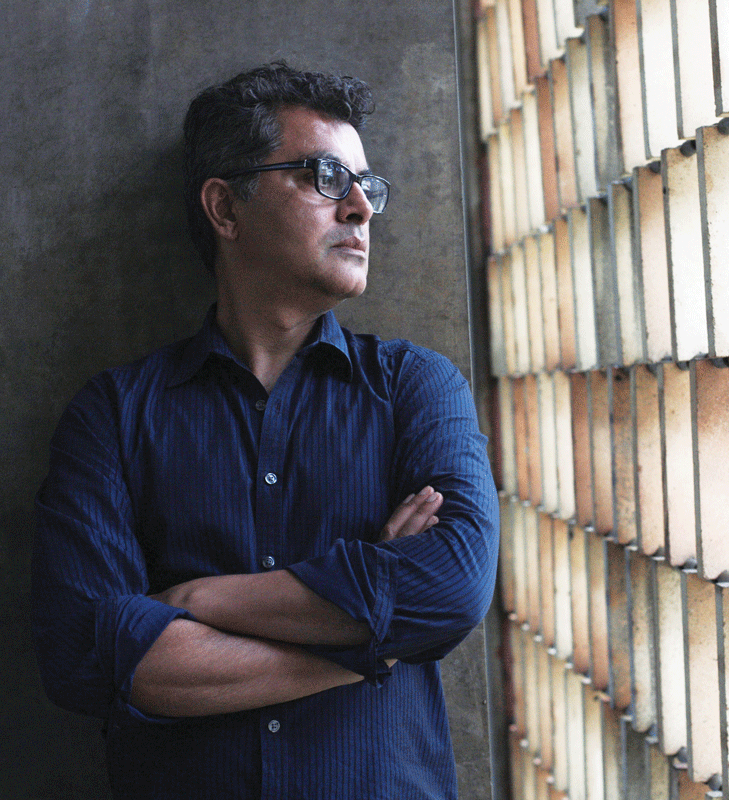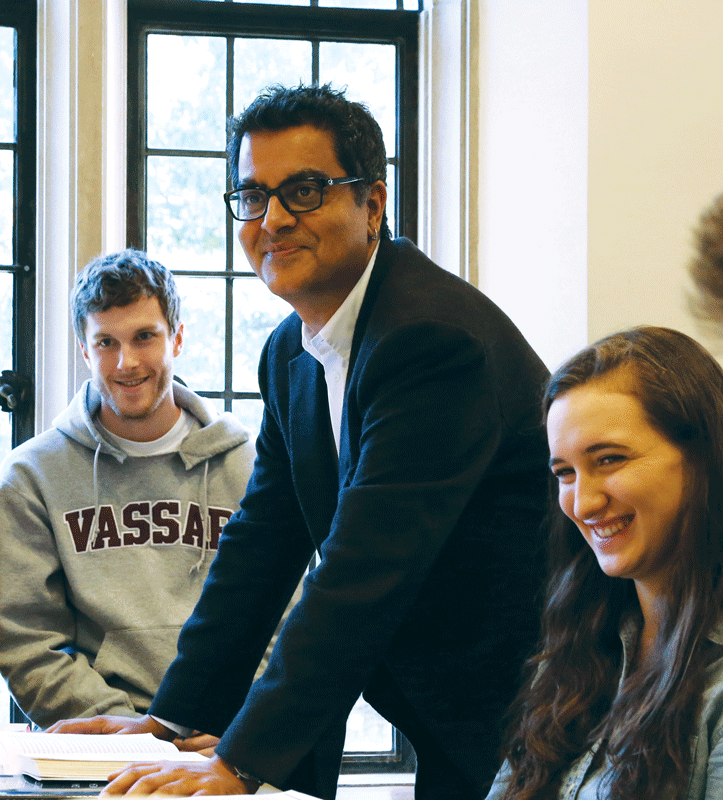Lunch With Professor Amitava Kumar

Amitava Kumar opens the door with a warm smile, welcoming me into a small kitchen bursting with family life. He lives in faculty housing with his wife, SUNY New Paltz professor Mona Ali, and their two children. There’s a treadmill under the window and a table layered with books by Teju Cole and Ivan Vladislavic, as well as books on Lego and Star Wars.
Kumar has just published his eighth book, a collection of essays, titled Lunch with a Bigot (Duke University Press, May 2015). He’s also written for the New York Times, the Guardian, Harper’s, Vanity Fair, Guernica, Hindustan Times, and the Paris Review, among others. As a noted Hindu intellectual married to a Muslim, he’s been a go-to talking head on the recent controversy over PEN American Center’s decision to honor Charlie Hebdo. But right now he’s all about cooking.
“The book has lunch in its title. So I am making you lunch,” he says.
Kumar ties on an apron, draping a red towel on one shoulder like a toreador. “My specialty for the children is pancakes,” he explains, chopping onions. “They don’t care for Indian food. The tragedy of the immigrant: They say it’s too spicy.”
Popping a samosa from Route 9’s Krishna Grocery into the microwave, he sounds like a Food Channel host: “Today we will have chicken curry, rice with peas, fried potatoes with rosemary and Indian spices, and a tomato relish.”

This leads into a riff on the drawbacks of conducting interviews in restaurants (“Torture doesn’t go well with naan”) and advice he gives to journalism students (“Don’t rely on the tape recorder, and not just because they break. You want a pad just to note things: this soap with aloe and olive oil, releasing a scent of geraniums”).
Kumar’s conversation is a heady admixture of intellectual rigor and playfulness. He makes sudden hummingbird swoops, darting from subject to subject before drinking deeply from something that interests him. His cooking style mirrors his speech; he crisscrosses the kitchen in flip-flops, opening cabinets for spices or crouching to search for a can of tomato paste. Somehow it all coalesces.
As Professor of English on the Helen D. Lockwood Chair at Vassar, Kumar teaches creative writing, journalism, and literature. His own work covers these bases, often blending them to creative effect. Last semester he offered a course called The In-Between Novel, which explored such literary genre-benders as David Shields, Renata Adler, J.M. Coetzee, and V.S. Naipaul. Kumar observes, “The best, most interesting work is done in the in-between spaces, anything that operates between borders.”
He tosses spiced chicken in a wok with Italian olive oil. “I want my students to have a sense of pleasure in the fertile give-and-take among genres,” he says. He also urges them to continue their inquiry beyond the classroom and interview sources in person.
Kumar follows his own advice. He says journalism has made him “go out in the world.” The 26 essays in Lunch with a Bigot bring Kumar to his childhood home in Patna, India (also the subject of his 2014 book A Matter of Rats), to a refugee camp in Ahmedabad, to embattled Kashmir, to a Bihari village in Jharkhand poisoned by uranium mining, to Beijing’s Hongqiao Market and Disney World—and to the titular lunch.
After finding his name on an enemies list posted by the ultra-right website Hindu Unity, Kumar tried to contact its anonymous host. His emails went unanswered, but another contact gave him a phone number for a retired legal secretary in Queens who’d established the website. Kumar called him immediately. When the man called him a “dog” and a “bastard,” maligning his cross-cultural marriage and travels to Pakistan, Kumar answered, “I would very much like to meet you.”
He writes, “I wanted to see his face. I found the idea of a faceless enemy unbearable. This wasn’t a psychological problem so much as a writer’s problem. I wanted detail and voice.” (He did eventually get to meet the man face-to-face.)
“Detail and voice” are elements Kumar exhorts his students to seek, in and out of the classroom. “Write every day and walk every day,” he tells them, assigning them to carry a pencil and pad for the achievable goal of “150 words daily and a brief round of mindful walking.”
That discipline and his directive to look for complexities beneath the surface have spurred on a new generation of writers. In a follow-up email, Kumar asks: “May I express a bit of pride in my students? My students have been hired at places like the Nation, the New Yorker, and Foreign Affairs; they have also been admitted to prestigious MFA programs like Cornell, Columbia, and Brown. One of my earliest Vassar students, Lucas Mann [’08], has his second book coming out this month.” (His first, Class A, was a Barnes & Noble Discover Great New Writers selection.)
Carrying plates loaded with food, the multitasking professor ushers me into his living room, where everything in sight—the overstuffed bookshelves, black-and-white family photos, a Bollywood movie poster, a striking oil painting of an Indian magazine seller surrounded by violent headlines—seems poised to launch new conversations. The world Amitava Kumar inhabits is vibrant and wide.
Lunch is delicious. He can cook, too.
Nina Shengold is books editor at Chronogram magazine and hosts Kingston's World Cafe author series. Her profiles have appears in Poets & Writers and River of Words: Portraits of Hudson Valley Writers (SUNY Press).
